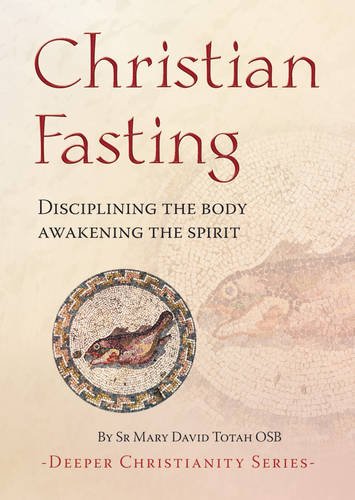As we begin the season of Lent, we mark its beginning on Ash Wednesday with the visible outward sign of ashes imposed on the head. We also mark it as just one of two days during the year (both in Lent) where all adults from the ages of 18-58 (inclusive) are required to fast. That is not a visible sign (people can’t see “fasting” like they can ashes on your forehead) but it does involve the body.
And that is part of the point. What we do with the body affects the soul and the whole spiritual life. For those who were born Catholic, we might not think much about the meaning of fasting – we just do it because it’s required by the Church. But it is always a good policy to know why we do what the faith requires of us, so we can gain the maximal benefit from this knowledge.
I recommend an excellent booklet on fasting put out by the British Catholic Truth Society (a group dedicated to advancing the faith). It’s entitled, Christian Fasting: Disciplining the Body, Awakening the Spirit. The author, a Benedictine nun, dives deep into the meaning and significance of fasting, as well as its biblical roots, and explains what is unique about Christian fasting, even though most other religions practice it as well. Unfortunately, the book is no longer in print, but it is available in e-book format on some of the largest booksellers.
Many of the reflections that follow are taken from her booklet.
Why do we fast, then? Because we are not merely earthly creatures whose existence is bound by material things alone. The lower animals of course do not fast. But man, as the Lord famously said, “does not live by bread alone but on every Word that comes from the mouth of God.” That is, God created us to be “fed” not just by food for the belly that sustain our biological processes, but also to be “fed” by our relationship with Him, by our desire to do His will, by seeking to please Him and to follow His commandments, by getting to know Him through the many ways He chooses to reveal Himself to us – especially in prayer and Scriptures.
If we never fast, then we become, in a way, enslaved to our desires for physical goods. It is important to note that the food God gives us is not a bad thing – far from it: it is a great gift to share in the fruits of the earth. Rather, because we are weakened by sin, our desires become disordered. That is a technical term in the faith that means “out of whack” or “pointing to the wrong thing” or “out of proportion.” Without sin, we would have a deep desire to be fed by our conversation with God in prayer, even deeper than the desire for our next meal. Unfortunately, for most of us, sin reverses that: We would much rather have a nice juicy cheeseburger or ice cream sundae than spend half an hour reading the Bible or praying the Rosary.
The discipline of fasting helps “reset” that a little bit, and helps us get our priorities back in line. It is a discipline. Just as an athlete must discipline his body (for example, a wrestler might have to curtail his food intake to maintain proper fighting weight), we have to discipline our bodies to subordinate them to the will of God.
Sr. Totah, the author, calls fasting “the prayer of the body.” That’s a nice phrase. It reminds us that prayer is not just an abstraction or mental activity. We pray with the whole person, body, and soul. Our willingness to deprive the body of goods opens up the body to prayer.
Fasting is more than just about food. Because it is a discipline of the will in an area where the appetites of the body are often strongest (food and sexual pleasure tend to be our strongest appetites) it helps us more generally overcome excessive attachment to ourselves and “re-attach” ourselves to God. That’s a tricky concept. It means that we are training to love God first and foremost. If we are too attached to our own pleasure or self-interest, that puts an obstacle in the way of the love of God. Here’s how Pope Emeritus Benedict put it: “[Fasting] represents an important ascetical practice [of self-discipline], a spiritual arm to do battle against every possible disordered attachment to ourselves. Freely chosen detachment from the pleasures of food and other material goods helps the disciple of Christ to control the appetites of nature, weakened by original sin, whose negative effects impact the entire human person.”
Fasting also reminds us that the ordinary food we eat pales in comparison to the heavenly food we are privileged to receive at holy Mass (if we are in a state of grace): the Blessed Sacrament. If we are a little hungry in the body when we receive the Lord, then we will have a properly increased hunger for Jesus. [This was ‘baked in’ to the practice of Mass not too long ago when communicants had to fast from midnight or at least three hours before Communion time].
That idea is behind the words of St. Francis de Sales (one of the patrons of the Archdiocese of Cincinnati): “Besides the ordinary effect of fasting in raising the mind, subduing the flesh, confirming goodness and obtaining a heavenly reward, it is also a great matter to control greediness, and to keep the sensual appetites and the whole body subject to the law of the Spirit…”
